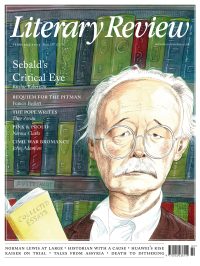Peter Davidson
Finishing Lines
On a recent visit to Ushaw College in County Durham, I saw an extraordinary building dedicated to an obscure sport at which a long-dead poet once excelled. Ushaw’s mighty Bounds Wall houses three vast handball courts and six smaller courts entered through pointed arches, like those of a cloister. It is a place redolent of the fantasies of Gothic England etched by Frederick Griggs in the early 20th century. Envisaged as both a school and a seminary, Ushaw College has its roots in the continental colleges founded when Catholicism was outlawed in England. The large courts are for a wallball game similar to fives or Irish handball, but played by teams of four. It seems likely that the four-a-side handball game played there (and in the gigantic neoclassical courts at Prior Park in Bath) was once common to several Catholic schools and had its origins in those years of exile.
The handball-playing poet was Francis Thompson (1859–1907), who attended Ushaw from the age of eleven. Thompson’s life after school was mostly a sad one: for eight years, from 1877 to 1885, he drifted in Manchester, failing to apply himself to his medical studies; then he fell into a life of destitution and addiction in London, from which he was rescued by the writers and editors Wilfrid and Alice Meynell. A minor mystery attends his Manchester years. There are strange near-echoes of the (then unpublished) Gerard Manley Hopkins’s writings in Thompson’s verse – archaic English words and metre not unlike sprung rhythm: ‘Like a flame-plumed fan shake slowly out’; ‘cloud-barred over thee the West’. While Thompson was in Manchester, Hopkins was intermittently associated with the Church of the Holy Name, near the college where Thompson was failing to study medicine. It is a mystery whether the convergences in the verse of these two Catholic poets in Victorian Lancashire are due to coincidence or to contact.
Thompson was not just a keen handball player. He was a distinguished all-round sportsman, as well as the author of one of the best pieces of verse about sport in English: ‘At Lord’s’. The poem is an elegy for the Lancashire cricketers of his drifting youth, the years when he

Sign Up to our newsletter
Receive free articles, highlights from the archive, news, details of prizes, and much more.@Lit_Review
Follow Literary Review on Twitter
Twitter Feed
Under its longest-serving editor, Graydon Carter, Vanity Fair was that rare thing – a New York society magazine that published serious journalism.
@PeterPeteryork looks at what Carter got right.
Peter York - Deluxe Editions
Peter York: Deluxe Editions - When the Going Was Good: An Editor’s Adventures During the Last Golden Age of Magazines by Graydon Carter
literaryreview.co.uk
Henry James returned to America in 1904 with three objectives: to see his brother William, to deliver a series of lectures on Balzac, and to gather material for a pair of books about modern America.
Peter Rose follows James out west.
Peter Rose - The Restless Analyst
Peter Rose: The Restless Analyst - Henry James Comes Home: Rediscovering America in the Gilded Age by Peter Brooks...
literaryreview.co.uk
Vladimir Putin served his apprenticeship in the KGB toward the end of the Cold War, a period during which Western societies were infiltrated by so-called 'illegals'.
Piers Brendon examines how the culture of Soviet spycraft shaped his thinking.
Piers Brendon - Tinker, Tailor, Sleeper, Troll
Piers Brendon: Tinker, Tailor, Sleeper, Troll - The Illegals: Russia’s Most Audacious Spies and the Plot to Infiltrate the West by Shaun Walker
literaryreview.co.uk